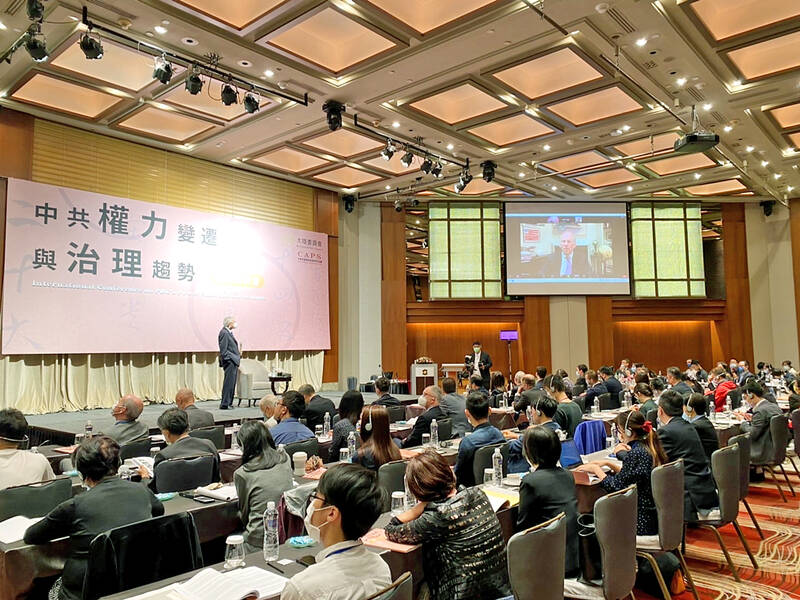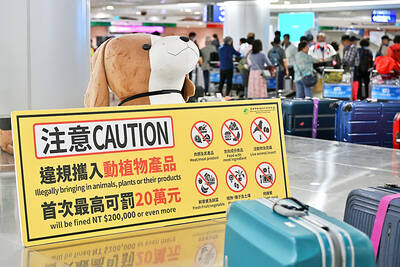Taiwan should improve its defense capabilities and reduce economic reliance on China, Council on Foreign Relations president Richard Haass told a forum on Chinese governance organized by the Mainland Affairs Council (MAC) and the Chinese Council of Advanced Policy Studies in Taipei yesterday.
Chinese President Xi Jinping (習近平) might take a more strident stance toward Taiwan to redirect frustrations over surging economic and political challenges in his third term, Haass and other US-based experts said.
Beijing is accustomed to constant economic growth, but China’s economic outlook has dimmed amid a brewing financial crisis, an aging population and the consequences of Xi’s “zero COVID-19” policy, Haass said.

Photo: CNA
Xi is likely to drum up nationalism, which he might hope would advance his ambitions to obtain political powers rivaling Mao Zedong’s (毛澤東) and secure a place in Chinese history for himself, he said.
China is putting Taiwan under pressure not because of specific actions taken by Taipei, but because Taiwanese democracy is the antithesis to Beijing’s system, he said, adding that Russia similarly resents Ukraine for being a democracy.
Xi could act toward Taiwan in a way similar to how Putin acted over Ukraine, and Taipei should take measures to transform the nation’s military and invest wisely in asymmetric defense capabilities such as missiles, he said.
Taiwan should build up energy resilience by creating a strategic reserve and making contingency plans to defend its digital infrastructure against cyberattacks, he said.
Taiwan and its allies should decrease economic dependence on China’s market, raw materials and any form of trade that has strategic implications, he said.
Beijing’s so-called “wolf warrior” diplomacy is based on performative acts that project an image of strength for a domestic audience, University of Colorado Denver professor Stephen Hartnett said.
Chinese diplomats’ focus on propaganda for a domestic audience suggests that China is conducting its international relations to externalize internal problems, he said.
Beijing’s response to US House of Representatives Speaker Nancy Pelosi’s visit to Taiwan is a manifestation of “traumatic nationalism,” which has prevailed in China since 1949, he said.
Beijing’s wolf warrior diplomacy — which has won Beijing no friends, but appeases a domestic audience — is also a symptom of traumatic nationalism, he said.
Such posturing could become a liability when words are not backed by action, leading to public discontent, he said, citing as an example a backlash on Chinese social media after Pelosi’s airplane was not shot down, as some people on social media had urged Beijing to do.
MAC Minister Chiu Tai-san (邱太三) told the opening panel that military confrontation is never a good option and urged Beijing to look at the issue with a fresh perspective.
“Military confrontation is by no means a good option for resolving differences between Taiwan and China, nor is it a blessing for the people on both sides,” Chiu said. “We hope that the other side would break from the outdated political mindset and have an open attitude to improve cross-strait relations.”
Since President Tsai Ing-wen (蔡英文) took office in 2016, Beijing has cut off communications with Taipei and suspended nearly all official exchanges between the two sides, saying it did so because Tsai refuses to recognize the so-called “1992 consensus.”
Chiu urged Beijing to resume dialogue with Taiwan without any prerequisites, as Taiwanese reject its “one China” principle and its plan to unify Taiwan under the “one country, two systems” model.
The so-called “1992 consensus,” a term former Mainland Affairs Council chairman Su Chi (蘇起) in 2006 admitted making up in 2000, refers to a tacit understanding between the Chinese Nationalist Party (KMT) and the Chinese government that both sides of the Strait acknowledge there is “one China,” with each side having its own interpretation of what “China” means.
Additional reporting by CNA

UKRAINE, NVIDIA: The US leader said the subject of Russia’s war had come up ‘very strongly,’ while Jenson Huang was hoping that the conversation was good Chinese President Xi Jinping (習近平) and US President Donald Trump had differing takes following their meeting in Busan, South Korea, yesterday. Xi said that the two sides should complete follow-up work as soon as possible to deliver tangible results that would provide “peace of mind” to China, the US and the rest of the world, while Trump hailed the “great success” of the talks. The two discussed trade, including a deal to reduce tariffs slapped on China for its role in the fentanyl trade, as well as cooperation in ending the war in Ukraine, among other issues, but they did not mention

Japanese Prime Minister Sanae Takaichi yesterday lavished US President Donald Trump with praise and vows of a “golden age” of ties on his visit to Tokyo, before inking a deal with Washington aimed at securing critical minerals. Takaichi — Japan’s first female prime minister — pulled out all the stops for Trump in her opening test on the international stage and even announced that she would nominate him for a Nobel Peace Prize, the White House said. Trump has become increasingly focused on the Nobel since his return to power in January and claims to have ended several conflicts around the world,

REASSURANCE: The US said Taiwan’s interests would not be harmed during the talk and that it remains steadfast in its support for the nation, the foreign minister said US President Donald Trump on Friday said he would bring up Taiwan with Chinese President Xi Jinping (習近平) during a meeting on the sidelines of the APEC Summit in South Korea this week. “I will be talking about Taiwan [with Xi],” Trump told reporters before he departed for his trip to Asia, adding that he had “a lot of respect for Taiwan.” “We have a lot to talk about with President Xi, and he has a lot to talk about with us. I think we’ll have a good meeting,” Trump said. Taiwan has long been a contentious issue between the US and China.

Taiwan’s first African swine fever (ASF) case has been confirmed and would soon be reported to the World Organization for Animal Health (WOAH), Minister of Agriculture Chen Junne-jih (陳駿季) yesterday. The Ministry of Agriculture’s Veterinary Research Institute yesterday completed the analysis of samples collected on Tuesday from dead pigs at a hog farm in Taichung and found they were ASF-positive. Animal and Plant Health Inspection Agency Animal Quarantine Division chief Lin Nien-nung (林念農) said the result would be reported to the WOAH and Taiwan’s major trade partners would also be notified, adding that pork exports would be suspended. As of Friday, all samples